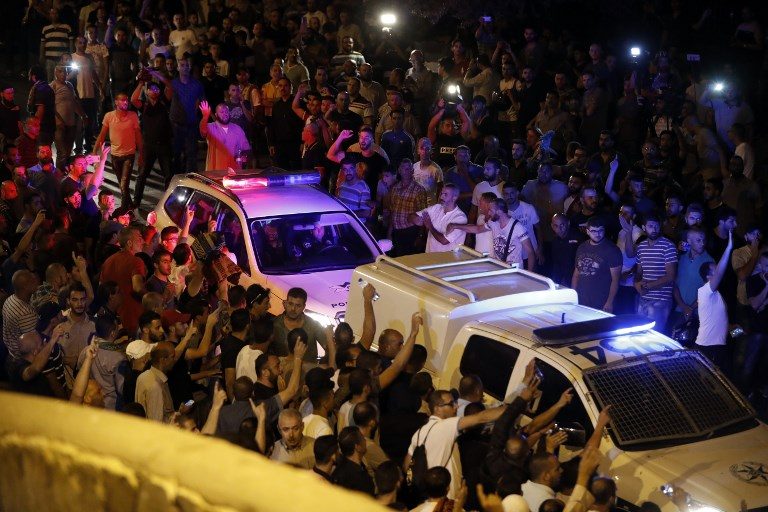SUMMARY
This is AI generated summarization, which may have errors. For context, always refer to the full article.

JERUSALEM – Two Palestinians died in clashes with Israeli forces Saturday, July 22, as the army moved in to seal off an attacker’s home after violence over security measures at an ultra-sensitive holy site.
The UN Security Council will hold closed-door talks Monday, July 24, about the spiraling violence after Egypt, France and Sweden sought a meeting to “urgently discuss how calls for de-escalation in Jerusalem can be supported”.
The deaths followed bloodshed on Friday, July 21, when a 19-year-old Palestinian killed 3 Israeli settlers in the occupied West Bank and 3 Palestinians died in clashes with Israeli forces.
On Saturday, Palestinian youths hurled stones and petrol bombs as the army used a bulldozer to close off the 19-year-old attacker’s West Bank village and prepare his house for probable demolition.
Israel frequently punishes the families of attackers by razing or sealing their homes as a deterrent, although rights groups say this amounts to collective punishment.
Clashes also flared in east Jerusalem and other Palestinian villages in the West Bank near Jerusalem, police said, adding that anti-riot measures were used against them.
At the Qalandiya crossing between the West Bank and Jerusalem, at least eight Palestinians were wounded, the Palestinian health ministry said.
A Palestinian died of wounds suffered in clashes east of Jerusalem, the ministry said.
It said 17-year-old Oday Nawajaa was hit by Israeli live fire at Al-Azariya.
Another Palestinian, 18, died nearby when a petrol bomb exploded prematurely.
Israel’s Shin Bet internal security agency meanwhile said Sunday, July 23, it had arrested 25 men active in the militant Hamas group that rules the Gaza Strip.
The arrests included “senior members,” a Shin Bet statement read, and was part of the security forces’ preventive measures in the wake of “the tensions around the Temple Mount”.
Also Sunday, a rocket fired at Israel from Gaza exploded mid-air, the Israeli army said, causing no injuries.
No Palestinian group claimed responsibility for the projectile.
The violence was triggered by security measures including metal detectors at the entrance to the Haram al-Sharif compound, known to Jews as the Temple Mount, ahead of the main weekly Friday prayers.
Israel imposed the measures after a gun and knife attack killed two Israeli policemen on July 14.
The Palestinians reject the measures, viewing them as Israel asserting further control over the holy site.
The site in Jerusalem’s Old City that includes the revered Al-Aqsa mosque and Dome of the Rock has been a focal point for Palestinians.
In 2000, then Israeli opposition leader Ariel Sharon’s visit to the compound helped ignite the second Palestinian intifada, or uprising, which lasted more than four years.
Israeli authorities say the July 14 attackers smuggled guns into the site and emerged from it to shoot the policemen.
Abbas freezes contacts
On Friday, clashes erupted around the Old City.
Three Palestinians aged between 17 and 20 were shot dead. The Red Crescent reported 450 people wounded in Jerusalem and the West Bank, including 170 from live or rubber bullets.
Later Friday, the 19-year-old Palestinian broke into a home in a Jewish settlement in the West Bank and stabbed four Israelis, killing three.
He was shot by a neighbor and taken to hospital.
The Israeli army said he had spoken in a Facebook post of the Jerusalem holy site and of dying as a martyr.
The Israelis killed in Neve Tsuf, north of Ramallah and also known as Halamish, were Yosef Salomon, 70, his daughter Haya Salomon, 46, and son Elad Salomon, 36, officials said. The grandmother was wounded.
Israeli soldiers raided the Palestinian’s nearby village of Kobar overnight and arrested his brother, the army said.
Amid mounting pressure to respond to the dispute, Palestinian president Mahmud Abbas announced late Friday he was freezing contacts with Israel.
There was no immediate public reaction from Prime Minister Benjamin Netanyahu.
Turkish President Recep Tayyip Erdogan denounced what he called the “excessive use of force” by the Israelis in Friday’s clashes.
The United States, Russia, the European Union and the United Nations – the so-called Middle East Quartet – urged all sides to “demonstrate maximum restraint.”
The quartet members “strongly condemn acts of terror, express their regret for all loss of innocent life caused by the violence.”
‘For all Muslims’
“Violence is likely to worsen absent a major policy shift,” said Ofer Zalzberg, a senior analyst at the International Crisis Group.
“Netanyahu’s mistake was installing the metal detectors without a Muslim interlocutor. It is the coercive character more than the security measure itself that made this unacceptable for Palestinians.”
On Saturday, entrances to Jerusalem’s walled Old City were open amid heavy security.
The metal detectors also remained at the entrance to the mosque compound.
“Al-Aqsa – that’s for the Muslims, not for the Jewish,” said Mohammad Haroub, a 42-year-old shopkeeper.
Like hundreds of others, he prayed outside on Friday instead of passing through the metal detectors.
The Haram al-Sharif/Temple Mount is central to the Israeli-Palestinian conflict.
It is in east Jerusalem, seized by Israel in the 1967 Six-Day War and later annexed in a move never recognized by the international community.
It is considered the third holiest site in Islam and the most sacred for Jews. – Rappler.com
Add a comment
How does this make you feel?
There are no comments yet. Add your comment to start the conversation.